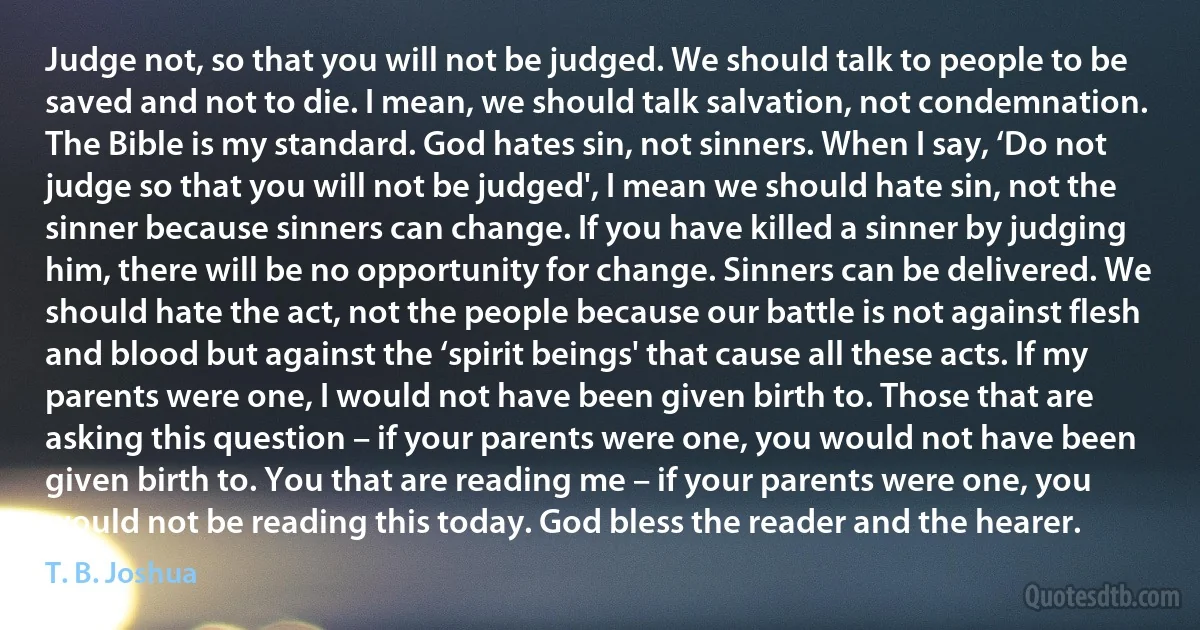
Judge not, so that you will not be judged. We should talk to people to be saved and not to die. I mean, we should talk salvation, not condemnation. The Bible is my standard. God hates sin, not sinners. When I say, ‘Do not judge so that you will not be judged', I mean we should hate sin, not the sinner because sinners can change. If you have killed a sinner by judging him, there will be no opportunity for change. Sinners can be delivered. We should hate the act, not the people because our battle is not against flesh and blood but against the ‘spirit beings' that cause all these acts. If my parents were one, I would not have been given birth to. Those that are asking this question – if your parents were one, you would not have been given birth to. You that are reading me – if your parents were one, you would not be reading this today. God bless the reader and the hearer.
T. B. JoshuaRelated topics
act asking battle birth blood cause change condemnation die flesh given hate judge mean opportunity people question reading say should sin spirit talk today actsRelated quotes
I will take the Government of the United States, and the laws of Missouri and Illinois, from the year 1833 to 1845, and if they had been carried out according to their letter and spirit, they would have strung up the murderers and mobocrats who illegally and unrighteously killed, plundered, harassed, and expelled us. I will tell you how much I love those characters. If they had any respect to their own welfare, they would come forth and say, whether Joseph Smith was a Prophet or not, "We shed his blood, and now let us atone for it;" and they would be willing to have their heads chopped off, that their blood might run upon the ground, and the smoke of it rise before the Lord as an incense for their sins. I love them that much. But if the Lord wishes them to live and foam out their sins before all men and women, it is all right, I care not where they go, or what they do.

Brigham Young
They will say to you," growled a kneeling man who stooped with his two bands in the earth and shook his shoulders like a mastiff, 'My friend, you have been a wonderful hero!' I don't want them to say it!
"Heroes? Some sort of extraordinary being? Idols? Rot! We've been murderers. We have respectably followed the trade of hangmen. We shall do it again with all our might, because it's of great importance to follow that trade, so as to punish war and smother it. The act of slaughter is always ignoble; sometimes necessary, but always ignoble. Yes, hard and persistent murderers, that's what we've been. But don't talk to me about military virtue because I've killed Germans."
"Nor to me," cried another in so loud a voice that no one could have replied to him even had he dared; "nor to me, because I've saved the lives of Frenchmen! Why, we might as well set fire to houses for the sake of the excellence of life-saving!

Henri Barbusse
The advance of liberalism, so-called, in Christianity, during the past fifty years, may fairly be called a victory of healthy-mindedness within the church over the morbidness with which the old hell-fire theology was more harmoniously related. We have now whole congregations whose preachers, far from magnifying our consciousness of sin, seem devoted rather to making little of it. They ignore, or even deny, eternal punishment, and insist on the dignity rather than on the depravity of man. They look at the continual preoccupation of the old-fashioned Christian with the salvation of his soul as something sickly and reprehensible rather than admirable; and a sanguine and 'muscular' attitude, which to our forefathers would have seemed purely heathen, has become in their eyes an ideal element of Christian character. I am not asking whether or not they are right, I am only pointing out the change.

William James
There...is the necessity for freedom of speech and the arts. We have to scrutinize all the advances of society to judge whether they are cruel or frustrate cruelty, and for that purpose we must hear the evidence of all persons affected by their operation and of all persons qualified by experience or learning or speculative gifts to form an interesting opinion on what those operations might be. It is therefore necessary that all classes of men should be given the fullest opportunity to express themselves without constraint, not only out of admiration for an abstraction, but as a practical measure toward human survival. It is also necessary that the artist, of whatsoever kind, should be free to anatomize the spirit, so that we can comprehend the battlefield that is this life, and which are the troops of light and which of darkness, and what light may be, and darkness.

Rebecca West
Personally, I never met Knut Wicksell. I saw him once when he delivered a lecture in Oslo, but being an unassuming student at the time, I did not have the courage to talk to him. So my knowledge of his theory came only through his writings. That, however, was a very intense and absorbing form of making his acquaintance. Already from my early student days, I read his writings (in German and Swedish) avidly. And I continued to do so later.
When I started my study on Wicksell, I found that his works were not easy reading. Often it was only at the third or fourth reading that I grasped his ideas. Invariably, each new reading made me more and more enthusiastic. Sometimes it happened that I thought I had finally caught him in an inconsistency or in unclear thinking. Every time this happened, it turned out, however, that the error was mine.

Ragnar Frisch
